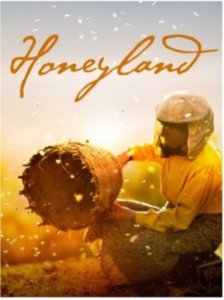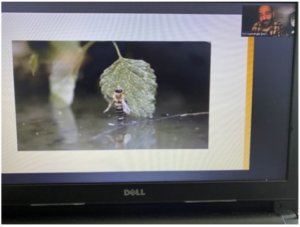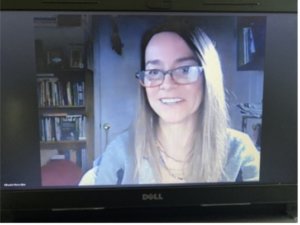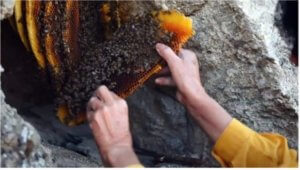By Emilia Intili
The Institute for Global Understanding (IGU) co-hosted the fourth World Cinema Series discussion spotlighting the theme “A Delicate Balance: Global Communities and the Natural World” by examining the story and impact of  the 2019 film Honeyland. Dr. Thomas Pearson moderated this event with faculty discussants Dr. Pedram Daneshgar and Dr. Mihaela Moscaliuc on March 11 at 7:30 p.m. via Zoom.
the 2019 film Honeyland. Dr. Thomas Pearson moderated this event with faculty discussants Dr. Pedram Daneshgar and Dr. Mihaela Moscaliuc on March 11 at 7:30 p.m. via Zoom.
The international sensation Honeyland is a documentary drama that takes place in Northern Macedonia. The main character, Hatidze Muratova, is a female beekeeper who respects the fragile balance of the bees and their sustainable production of honey. When a nomadic family invades her small village, the father of the family, Hussein Sam, compromises the bees of the land and Hatidze’s livelihood. This film explores how adherence to an Indigenous tradition protects natural resources and impacts human behavior.
Dr. Pedram Daneshgar, Associate Professor of Biology and recipient of the 2020 Distinguished Teaching Award at Monmouth University, has extensively researched the biology and ecology of the stars of the film: bees. He emphasized that bees work extremely hard to gather nectar and pollen when flowers are in bloom. While consuming some, they ultimately bring back much more to the hive in order to sustain it, especially during the inactive winter months.
Associate Professor of Biology and recipient of the 2020 Distinguished Teaching Award at Monmouth University, has extensively researched the biology and ecology of the stars of the film: bees. He emphasized that bees work extremely hard to gather nectar and pollen when flowers are in bloom. While consuming some, they ultimately bring back much more to the hive in order to sustain it, especially during the inactive winter months.
 Dr. Mihaela Moscaliuc, Associate Professor of English and the recipient of a Fulbright fellowship to Romania, discussed bees in their ecological symbolism across cultures and recent centuries. She also examined the interaction and structures of labor and care between the characters Hatidze and Hussain. Both of these characters depend on natural resources for survival; however, they represent two different positions on how their dependency works.
Dr. Mihaela Moscaliuc, Associate Professor of English and the recipient of a Fulbright fellowship to Romania, discussed bees in their ecological symbolism across cultures and recent centuries. She also examined the interaction and structures of labor and care between the characters Hatidze and Hussain. Both of these characters depend on natural resources for survival; however, they represent two different positions on how their dependency works.
Hussain is a migrant capital herder who works to provide for his large family and sees bees and their honey as a temporary, seasonal undertaking to supplement his income. As a result of his greed, his beekeeping is done in a hurry, and he is not interested in truly learning or understanding the bees and their habitat. Hatidze, on the other hand, sings to the bees and treats them with the utmost care, doing so in a way in which hum an beings are merely guests to the home that is the Earth. She lives and works with the bees — not as their owner but as a guest in a world where there are sufficient resources for everyone as long as each person learns that there is enough on which to live and enough to sell if one can behave responsibly and honor the resources that others provide.
an beings are merely guests to the home that is the Earth. She lives and works with the bees — not as their owner but as a guest in a world where there are sufficient resources for everyone as long as each person learns that there is enough on which to live and enough to sell if one can behave responsibly and honor the resources that others provide.
In the film, Hatidze’s mantra is “half for me and half for you;” she only takes half of the honeycomb the bees “gave to her.” In contrast, her neighbor, Hussain, overharvested honey for a commercial merchant, which deprived the bees of their ability to sustain their hive in the colder weather. When his bees no longer had a food source, they preyed upon all the other beehives in the village, leading to their demise.
The film’s message addresses the dangers of overexploitation of natural resources, which underscores the fragile balance between nature and human beings.
